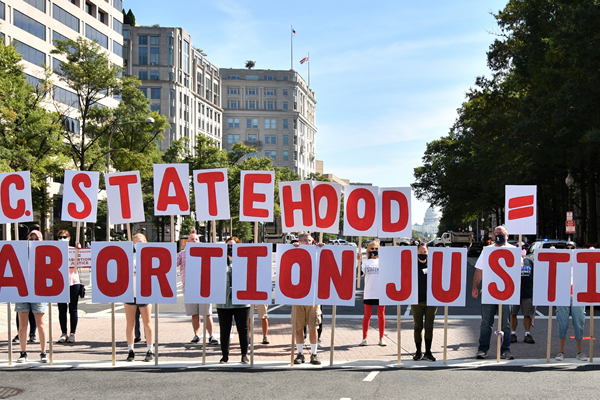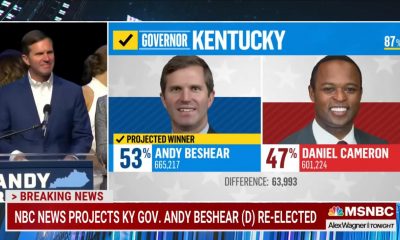National
Legal advocates turn attention to Supreme Court abortion cases
No major LGBTQ rights cases before court this term

With the new term for the U.S. Supreme Court underway, justices for the first time in years won’t have to consider a major case specifically impacting LGBTQ rights, which legal advocates say will lead to them to focus their attention on high-profile cases that challenge a woman’s right to access abortion.
At the top of the watch list for court, which now has 6-3 conservative majority as a result of appointments under former President Trump, is Dobbs v. Jackson Women’s Health Organization, which will determine the constitutionality of the Mississippi law banning abortion after 15 weeks and is widely considered a direct challenge to long-standing precedent established by Roe v. Wade guaranteeing a right to abortion. The Texas law banning any abortion after six weeks, which the Supreme Court allowed to take effect as litigation against it proceeds, is still pending in lower courts, but will likely reach the high court soon.
For many LGBTQ legal advocates, the abortion cases are important because they say the outcome could directly impact legal precedent underpinning major Supreme Court decisions in favor, including the 2003 decision of Lawrence v. Texas, which struck down state bans on sodomy, and the 2015 decision of Obergefell v. Hodges in favor of same-sex marriage nationwide.
Camilla Taylor, director of constitutional litigation for Lambda Legal, said the outcome abortion cases is crucial not only because LGBTQ people need access to abortion.
“Just as importantly, there are a lot of ways in which the landmark precedents that we obtained that vindicate the rights of LGBT people rely upon a foundation of substantive due process precedent that includes Roe v. Wade, and other cases dealing with reproductive health,” Taylor said. “So, if Roe versus Wade crumbles, then the foundation on which our own cases also crumbles.”
As such, a coalition of LGBTQ legal groups—including the National Center for Lesbian Rights, the National Center for Transgender Equality and Equality California—was among those who filed a friend-of-the-court brief in September arguing the Mississippi law is unconstitutional.
Key among the arguments is the denial of abortion access is a form of sex discrimination, just as the Supreme Court determined last year in Bostock v. Clayton County that anti-LGBTQ discrimination is a form of sex discrimination, this illegal under the Civil Rights Act of 1964.
“By the same logic, laws that restrict abortion also facially discriminate based on sex,” the brief says, “Like being LGBTQ, pregnancy is a sex-based characteristic; it is ‘inextricably bound up with’ an individual’s sex. Accordingly, laws that force a pregnant woman to bear a child necessarily discriminate based on sex, as would a law that barred a reproductive medical procedure available only to men.”
It’s true that both Roe v. Wade and the Supreme Court’s decision for LGBTQ were based on principals of due process and equal protection under the 5th and 14th Amendments of the U.S. Constitution. But not all legal experts agree LGBTQ rights are on the line depending on the outcome of abortion litigation.
Dale Carpenter, a conservative law professor at the SMU (Southern Methodist University) Dedman School of Law who’s written in favor of LGBTQ rights, said the Supreme Court is “probably going to write a narrower opinion, if it even overrules Roe,” but won’t issue a radical decision “that reaches out and destroys all unenumerated rights.”
“Obergefell relies on the fundamental right to marry,” Carpenter said. “There’s no chance the Supreme Court is going to say there is no right to a fundamental right to marry. The doctrine upon which Obergefell rests is on much more solid footing than abortion rights. The basic doctrine underlying Obergefell has never seriously been challenged; abortion rights have been for 50 years.”
Other key differences between the right to abortion and same-sex marriage, Carpenter said, are an arguable state interest in protecting fetal life and reliance interests in the case of marriage rights given thousands of same-sex couples have wed in the wake of the Obergefell decision.
But what about Lawrence v. Texas, which were both that LGBTQ rights decision and Roe v. Wade decided at least in part on finding an unenumerated right to privacy in the constitution? Carpenter said a Supreme Court decision undoing a right to privacy would mean undoing nearly 60-year precedent that began with the 1965 decision in Griswold v. Connecticut, which overturned a state ban on contraceptives.
“There’s not even a single brief in the case, that I know of, on the anti-abortion side that’s supporting that,” Carpenter said.
Carpenter concluded with a wry jab: “By the way, the LGBT rights advocates who are now saying that these LGBT rights decisions are in danger will be the same people say after Roe is a overruled that those decisions are not affected.”
Indeed, the Supreme Court under its current 6-3 conservative makeup had an opportunity to take up an Indiana birth certificate case, Box v. Henderson, that was a direct challenge to the Obergefell marriage decision, but declined to take up the case. No state is any where close to recriminalizing sexual relations for same-sex couples, which in 2021 would widely be seen as a human rights violation.
But legal advocates for the LGBTQ community aren’t limiting the relationship between abortion and LGBTQ rights to legal principles. Additionally, the identify solidarity with another minority group under siege, in this case women seeking access to abortion, and need among certain members of the LGBTQ community—lesbian and bisexual women, transgender men and non-binary people—to have the access to abortion.
Shannon Minter, legal director for the National Center for Lesbian Rights, echoed the sense LGBTQ legal advocates are focused on abortion cases, but cited “overlap between the reproductive rights, and justice movement and the LGBTQ movements.”
“What we see is the primary impact of this case on our community is a very direct one,” Minter said. “It’s extremely direct. The ability to obtain abortions is of great importance to women in our community, and also to transgender men and non-binary people as well.”
Minter cited data finding upwards of 80 percent of bisexual women will experience pregnancy over their lives and said LGBTQ women “are significantly more likely to have unintended pregnancies as a result of sexual violence, which is very distressing, but that is a reality for our community.”
Lesbian young adults and adolescents are at particular risk for unwanted pregnancy, Minter added, because there’s still “so much stigma and discrimination that they tried to sort of hide their sexual orientation, and prove that they’re straight when they’re not, so they actually have high rates of unprotected sex.”
Religious schools funding, gun control, Obamacare on docket
The abortion cases aren’t the only litigation on the radar for LGBTQ legal advocates. Also on the list are cases that will determine whether Maine religious schools have access to public funds, the legality of New York State gun regulations and disparate impact claims under Obamacare.
Taylor said the case of CVS Pharmacy v. Doe before the Supreme Court, which was brought by people living with HIV/AIDS, will determine whether disparate impact claims are cognizable in the context of disabilities under the Affordable Care Act.
“That’s really important for people living with HIV and other people with disabilities,” Taylor said. “It could do a lot of harm.”
The oral arguments in the Dobbs case are set to take place before the Supreme Court on Dec. 1.
State Department
State Department releases annual human rights report
Antony Blinken reiterates criticism of Uganda’s Anti-Homosexuality Act

Secretary of State Antony Blinken on Monday once again reiterated his criticism of Uganda’s Anti-Homosexuality Act upon release of the State Department’s annual human rights report.
“This year’s report also captures human rights abuses against members of vulnerable communities,” he told reporters. “In Afghanistan, the Taliban have limited work opportunities for women, shuttered institutions found educating girls, and increasing floggings for women and men accused of, quote, ‘immoral behavior,’ end quote. Uganda passed a draconian and discriminatory Anti-Homosexuality Act, threatening LGBTQI+ individuals with life imprisonment, even death, simply for being with the person they loved.”
Ugandan President Yoweri Museveni last May signed the law, which contains a death penalty provision for “aggravated homosexuality.”
The U.S. subsequently imposed visa restrictions on Ugandan officials and removed the country from a program that allows sub-Saharan African countries to trade duty-free with the U.S. The World Bank Group also announced the suspension of new loans to Uganda.
Uganda’s Constitutional Court earlier this month refused to “nullify the Anti-Homosexuality Act in its totality.” More than a dozen Ugandan LGBTQ activists have appealed the ruling.
Clare Byarugaba of Chapter Four Uganda, a Ugandan LGBTQ rights group, on Monday met with National Security Council Chief-of-Staff Curtis Ried. Jay Gilliam, the senior LGBTQI+ coordinator for the U.S. Agency for International Development, in February traveled to Uganda and met with LGBTQ activists who discussed the Anti-Homosexuality Act’s impact.
“LGBTQI+ activists reported police arrested numerous individuals on the basis of their sexual orientation or gender identity and subjected many to forced anal exams, a medically discredited practice with no evidentiary value that was considered a form of cruel, inhuman, and degrading treatment and could amount to torture,” reads the human rights report.
The report, among other things, also notes Ugandan human rights activists “reported numerous instances of state and non-state actor violence and harassment against LGBTQI+ persons and noted authorities did not adequately investigate the cases.”
Report highlights anti-LGBTQ crackdowns in Ghana, Hungary, Russia
Ghanaian lawmakers on Feb. 28 approved the Promotion of Proper Human Sexual Rights and Ghanaian Family Values Bill. The country’s president, Nana Akufo-Addo, has said he will not sign the measure until the Ghanaian Supreme Court rules on whether it is constitutional or not.
The human rights report notes “laws criminalizing consensual same-sex sexual conduct between adults” and “crimes involving violence or threats of violence targeting lesbian, gay, bisexual, transgender, queer or intersex persons” are among the “significant human rights issues” in Ghana.
The report documents Hungarian Prime Minister Viktor Orbán and members of his right-wing Fidesz party’s continued rhetoric against “gender ideology.” It also notes Russia’s ongoing crackdown against LGBTQ people that includes reports of “state actors committed violence against LGBTQI+ individuals based on their sexual orientation or gender identity, particularly in Chechnya.”
The report specifically notes Russian President Vladimir Putin on July 24 signed a law that bans “legal gender recognition, medical interventions aimed at changing the sex of a person, and gender-affirming care.” It also points out Papua New Guinea is among the countries in which consensual same-sex sexual relations remain criminalized.

The Cook Islands and Mauritius in decriminalized homosexuality in 2023.
The report notes the Namibia Supreme Court last May ruled the country must recognize same-sex marriages legally performed outside the country. The report also highlights the Indian Supreme Court’s ruling against marriage equality that it issued last October. (It later announced it would consider an appeal of the decision.)
Congress requires the State Department to release a human rights report each year.
The Biden-Harris administration in 2021 released a memorandum that committed the U.S. to promoting LGBTQ+ and intersex rights abroad.
The full report can be read here.
National
Same-sex couples vulnerable to adverse effects of climate change
Williams Institute report based on Census, federal agencies

A new report by the Williams Institute at the UCLA School of Law finds that same-sex couples are at greater risk of experiencing the adverse effects of climate change compared to different-sex couples.
LGBTQ people in same-sex couple households disproportionately live in coastal areas and cities and areas with poorer infrastructure and less access to resources, making them more vulnerable to climate hazards.
Using U.S. Census data and climate risk assessment data from NASA and the Federal Emergency Management Agency, researchers conducted a geographic analysis to assess the climate risk impacting same-sex couples. NASA’s risk assessment focuses on changes to meteorological patterns, infrastructure and built environment, and the presence of at-risk populations. FEMA’s assessment focuses on changes in the occurrence of severe weather events, accounting for at-risk populations, the availability of services, and access to resources.
Results show counties with a higher proportion of same-sex couples are, on average, at increased risk from environmental, infrastructure, and social vulnerabilities due to climate change.
“Given the disparate impact of climate change on LGBTQ populations, climate change policies, including disaster preparedness, response, and recovery plans, must address the specific needs and vulnerabilities facing LGBTQ people,” said study co-author Ari Shaw, senior fellow and director of international programs at the Williams Institute. “Policies should focus on mitigating discriminatory housing and urban development practices, making shelters safe spaces for LGBT people, and ensuring that relief aid reaches displaced LGBTQ individuals and families.”
“Factors underlying the geographic vulnerability are crucial to understanding why same-sex couples are threatened by climate change and whether the findings in our study apply to the broader LGBTQ population,” said study co-author Lindsay Mahowald, research data analyst at the Williams Institute. “More research is needed to examine how disparities in housing, employment, and health care among LGBT people compound the geographic vulnerabilities to climate change.”
Read the report
Federal Government
Lambda Legal praises Biden-Harris administration’s finalized Title IX regulations
New rules to take effect Aug. 1

The Biden-Harris administration’s revised Title IX policy “protects LGBTQ+ students from discrimination and other abuse,” Lambda Legal said in a statement praising the U.S. Department of Education’s issuance of the final rule on Friday.
Slated to take effect on Aug. 1, the new regulations constitute an expansion of the 1972 Title IX civil rights law, which prohibits sex-based discrimination in education programs that receive federal funding.
Pursuant to the U.S. Supreme Court’s ruling in the landmark 2020 Bostock v. Clayton County case, the department’s revised policy clarifies that discrimination on the basis of sexual orientation and gender identity constitutes sex-based discrimination as defined under the law.
“These regulations make it crystal clear that everyone can access schools that are safe, welcoming and that respect their rights,” Education Secretary Miguel Cardona said during a call with reporters on Thursday.
While the new rule does not provide guidance on whether schools must allow transgender students to play on sports teams corresponding with their gender identity to comply with Title IX, the question is addressed in a separate rule proposed by the agency in April.
The administration’s new policy also reverses some Trump-era Title IX rules governing how schools must respond to reports of sexual harassment and sexual assault, which were widely seen as imbalanced in favor of the accused.
Jennifer Klein, the director of the White House Gender Policy Council, said during Thursday’s call that the department sought to strike a balance with respect to these issues, “reaffirming our longstanding commitment to fundamental fairness.”
“We applaud the Biden administration’s action to rescind the legally unsound, cruel, and dangerous sexual harassment and assault rule of the previous administration,” Lambda Legal Nonbinary and Transgender Rights Project Director Sasha Buchert said in the group’s statement on Friday.
“Today’s rule instead appropriately underscores that Title IX’s civil rights protections clearly cover LGBTQ+ students, as well as survivors and pregnant and parenting students across race and gender identity,” she said. “Schools must be places where students can learn and thrive free of harassment, discrimination, and other abuse.”
-

 South America3 days ago
South America3 days agoDaniel Zamudio murderer’s parole request denied
-

 Maryland4 days ago
Maryland4 days agoMontgomery County police chief discusses arrest of trans student charged with planned school shooting
-

 Politics5 days ago
Politics5 days agoCourt records raise concerns about right-wing TikTok investor’s influence
-

 Commentary4 days ago
Commentary4 days agoWorld ‘isn’t much different today’












